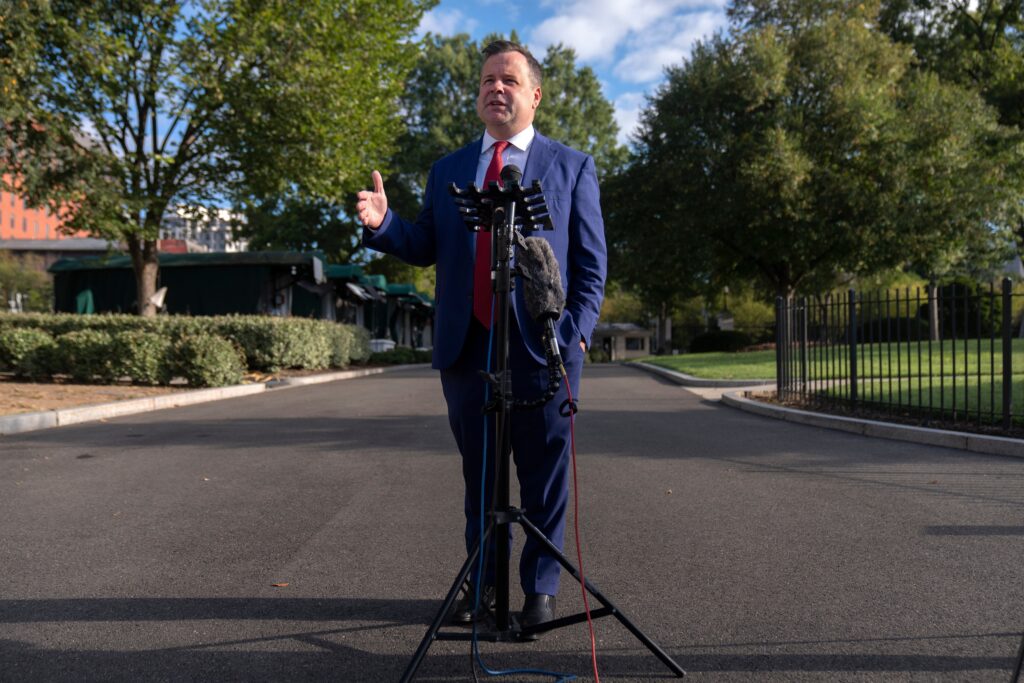When President Donald Trump accused Sen. Adam Schiff (D-California) of mortgage fraud in July, he posted a document on Truth Social that he said proved Schiff was a “thief.” That quickly blew up the phone of a GOP congressional candidate and real estate agent from California, Christine Bish — who recognized the document as one of hundreds she sent to an administration tip line collecting information about alleged mortgage fraud.
Until then, Bish wasn’t sure if her April email caught anyone’s attention in Washington, she told The Washington Post on Friday. But she knew Trump’s post drew from her files because of the highlights marking up the page.
Trump had posted the document with “the most yellow on it,” she said.
Now Bish’s experience is providing an unexpected window into how inexperienced Trump loyalists in top administration positions are wielding their power.
Prosecutors spent more than an hour questioning Bish on Thursday about her communications with Justice Department official Ed Martin, Federal Housing Finance Agency Director Bill Pulte and others. They appeared to focus on whether these officials divulged information about the criminal investigation into Schiff to unauthorized people and repeatedly asked Bish whom she talked to, she told The Post. A subpoena issued to Bish and reviewed by The Post also shows that investigators appear focused on anyone she communicated with who claimed to be affiliated with Martin and Pulte.
Martin and Pulte are not being investigated by a grand jury, according to a person familiar with the investigation, who spoke on the condition of anonymity because they weren’t authorized to discuss it publicly. Grand jury probes are just one way that officials can investigate conduct, though they are a necessary step in securing indictments.
Yet the interactions highlight the unconventional and sometimes erratic nature of the administration’s attempt to prosecute Democrats on charges of mortgage fraud. Bish’s brief visit to Washington — and accompanying media blitz — showed how Pulte, Martin and their confidants are operating, with direct messages to strangers on social media and out-of-the-blue phone calls. And it revealed potential weaknesses in the mortgage fraud case against Schiff, one of the president’s Democratic foes.
In a statement, a Justice Department spokesperson said that “this Department of Justice is united as one team to execute on our mission to follow the facts in every case, prosecute crime, and make America safe again.”
The White House did not respond to a request for comment. A representative for Schiff declined to comment.
Pulte and the FHFA did not respond to questions about how tips are reviewed or vetted once they are sent in to the FHFA, or how Trump would have received Bish’s document.
On social media and in television interviews, Pulte routinely encourages people to send information to [email protected]. In August,he told Bloomberg Television that his office had received an “insane amount” of tips on mortgage fraud. He described the work as “right in the bull’s eye of what my job is.”
Pulte has accused Schiff, New York Attorney General Letitia James (D) and Federal Reserve Governor Lisa Cook — all prominent foils of Trump’s — of fraudulently claiming multiple homes as their primary residences in mortgage documents, which can sometimes help buyers secure lower rates. Pulte has referred several cases to the Justice Department for prosecution. Schiff has not been indicted, while James faces two charges linked to Pulte’s claims. Cook is fighting to keep her seat on the Fed board after Trump tried to fire her. Schiff, James and Cook all deny wrongdoing.
The cases have been controversial within the Justice Department. In the Eastern District of Virginia — where James was indicted — multiple prosecutors were pushed out, including Trump’s pick to run the office, in part because they did not believe there was sufficient evidence to bring charges against James. It fell to interim U.S. Attorney Lindsey Halligan — Trump’s last-minute, unexpected pick, who had no prosecutorial experience — to present the case to a grand jury and secure the indictment. It is unusual for a politically appointed U.S. attorney to present a case herself — suggesting that the office struggled to find a career attorney willing to take on the assignment.
In Maryland, prosecutors have similarly struggled to gather sufficient evidence to bring a case against Schiff, according to two people familiar with the matter, who spoke on the condition of anonymity to discuss private conversations. To bring a strong case against Schiff, prosecutors would need to show that the senator intentionally committed fraud, not just made paperwork errors.
Bish — who has spent years gathering evidence through public records against Schiff and other politicians who she believes are defrauding voters because they spend too much time in Washington — said she was shocked that investigators didn’t ask her more questions about the case.
She said she kept trying to steer officials back toward Schiff’s records. But they appeared more interested in learning who had contacted her about her findings, what they asked her and how they identified themselves, Bish said. At one point, she said she got frustrated with the trio of questioners — the prosecutor, an FBI agent and the FHFA inspector general — and called them the “Keystone Kops,” she said.
Bish said she started digging into Schiff’s mortgage records years ago when she was running for Congress in Sacramento and conducting opposition research on other politicians. She said her earlier jobs as a law firm investigator and loan officer gave her an affinity for hunting down public records. Convinced Schiff was guilty of wrongdoing, Bish said she has sent batches of his records to members of Congress and the House Ethics Committee in the past. No one followed up.
Then, earlier this year, Bish saw Pulte post about his new tip line. She emailed an extensive Dropbox file — full of her highlights and annotations — on April 30 and said she got a generic, automated reply.
Nothing happened until she missed a call from Pulte in July, right before Trump publicly accused Schiff of fraud on Truth Social. Bish said she was recovering from facial surgery at the time and didn’t return Pulte’s call.
On July 16, the day after Trump first accused Schiff of wrongdoing, Pulte sent Bish a direct message on X asking for her phone number, according to messages reviewed by The Post. She replied two days after and occasionally sent other tidbits. The two never spoke, but Pulte messaged back later on to ask for more information, including on Oct. 17, when he asked for “whatever schif docs you have.”
Pulte and the FHFA did not respond to questions asking why officials sought more information from Bish after the referral to the Justice Department had already been made.
In another instance, Bish said she got a phone call from Scott Strauss — a former Justice Department prosecutor who was pushed out of his job after attempting to launch investigations of baseless voter-fraud conspiracy theories tied to the 2020 election, according to three other people familiar with the matter, speaking on the condition of anonymity to discuss sensitive subjects. Bish said Strauss identified himself as working for Freddie Mac, the mortgage giant Pulte took over as chief executive earlier this year.
On Friday, a reporter tried to reach Strauss four times through the Freddie Mac employee directory. With each call, the operator said Strauss showed up in the system as an employee, but the calls never went through.
Pulte and the FHFA did not respond to questions about what Strauss does at the company.
The post Witness exposes unusual tactics used to prop up mortgage fraud cases appeared first on Washington Post.




